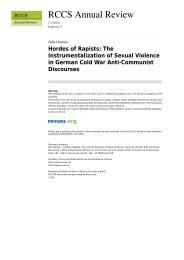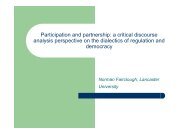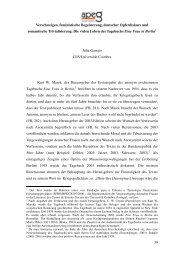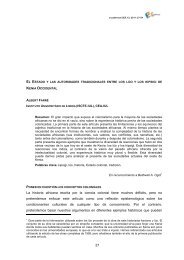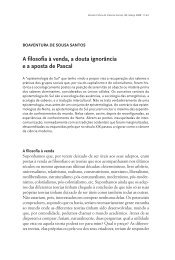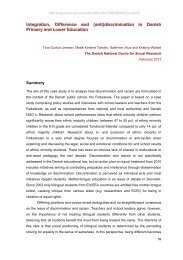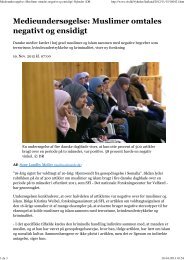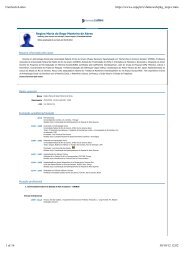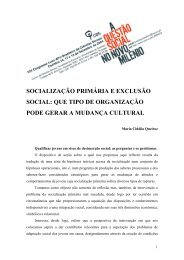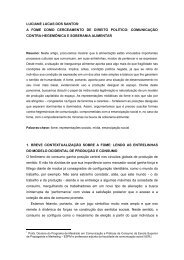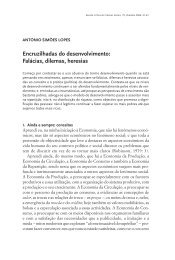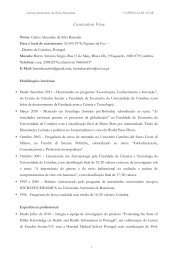Analysis of Integration Policies and Public State-Endorsed ...
Analysis of Integration Policies and Public State-Endorsed ...
Analysis of Integration Policies and Public State-Endorsed ...
Create successful ePaper yourself
Turn your PDF publications into a flip-book with our unique Google optimized e-Paper software.
Working paper produced within the TOLERACE project<br />
3. Danish legislation against discrimination <strong>and</strong> racism within a European<br />
context<br />
In Denmark there are three levels <strong>of</strong> legal protection against racism <strong>and</strong> discrimination:<br />
the national level, European level <strong>and</strong> the international level. These national laws, EU-<br />
directives <strong>and</strong> the UN -conventions involve different parties <strong>and</strong> institutions.<br />
3.1. Presentation <strong>of</strong> Danish legislation against discrimination <strong>and</strong> racism<br />
What is in popular jargon called the Act against Racism was the first Danish legal<br />
regulation <strong>of</strong> public expressions <strong>of</strong> racism or discrimination. The article was introduced<br />
into the criminal code in 1939, with the purpose <strong>of</strong> protecting Jews in Denmark. It was<br />
reformulated in 1971 in accordance to UN conventions on questions <strong>of</strong> anti-racism,<br />
exp<strong>and</strong>ed in 1987 to include sexual orientation, <strong>and</strong> tightened in 1995 considering <strong>of</strong><br />
acts <strong>of</strong> propag<strong>and</strong>a. During the 2000s, as a national response to the establishment <strong>of</strong><br />
both EU-directives <strong>and</strong> UN conventions, Denmark has passed a number <strong>of</strong> laws about<br />
anti-racism <strong>and</strong> tolerance. These laws are situated both within the criminal code, in<br />
labour market <strong>and</strong> in public services legislation (Hansen, 2000). The central acts are as<br />
follows:<br />
1. The Act against Racism (§ 266 b in the Danish criminal code, chapter 27 about<br />
defamatory actions), a person publicly or deliberately make a statement or other<br />
kinds <strong>of</strong> utterances, by which a group may be threatened, derided, or disgraced<br />
due to his or her race, skin colour, national or ethnic origin, belief or sexual<br />
orientation, is to be punished with penalty or prison up till two years. The<br />
sentence is increased in acts <strong>of</strong> propag<strong>and</strong>a.<br />
2. The Law against Hate Crimes. According to the criminal code § 81, no. 6, a<br />
sentence increases if the criminal act is targeting ethnic origin, belief, sexual<br />
orientation etc.<br />
3. The Act on Prohibition <strong>of</strong> Discrimination on the Labour Market. This law<br />
prohibits labour market discrimination on account <strong>of</strong> race, skin colour, religion or<br />
belief, political opinion, sexual orientation, age, h<strong>and</strong>icap or national, social or<br />
ethnic origin. The law may be used in cases <strong>of</strong> discrimination in relation to<br />
application to <strong>and</strong> occupation <strong>of</strong> vacant jobs, dismissal, transfers, promotions<br />
<strong>and</strong> salary <strong>and</strong> working conditions.<br />
4. The Act on Ethnic Equal Treatment prohibits discrimination on account <strong>of</strong> race<br />
or ethnic origin. The law applies to all public <strong>and</strong> private organization/enterprise<br />
65



